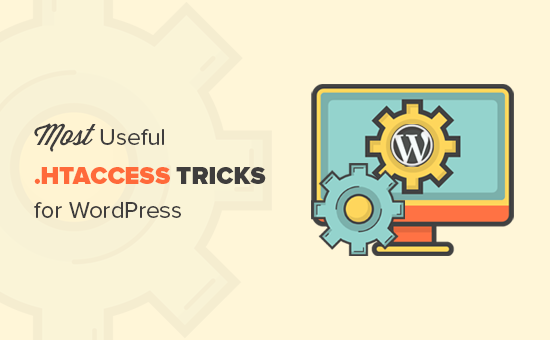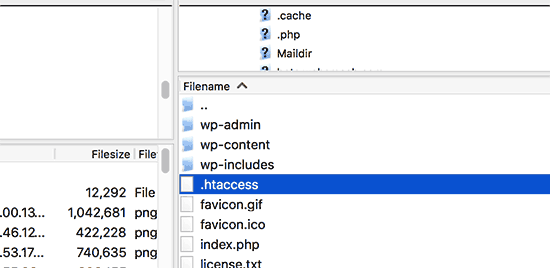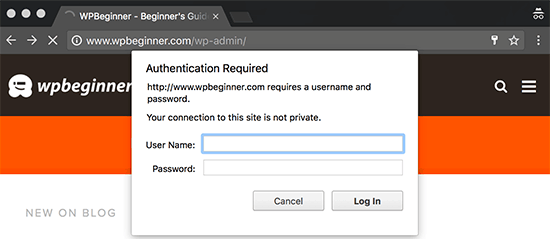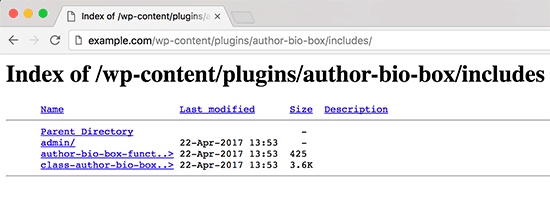サイトの.htaccessファイルを編集することは、WordPress初心者には敷居が高く聞こえるかもしれません。しかし私たちの経験では、.htaccessはサイトのパフォーマンス、セキュリティ、SEOを向上させるツールです。
このファイルは、コーディングのウィザードでなくても、サイトのサーバー設定を微調整するためのコントロールパネルと考えることができます。
この投稿では、WordPressの便利な.htaccessのトリックをいくつかご紹介します。

.htaccessファイルとは何ですか?
.htaccessファイルは、Apacheウェブサーバー設定ファイルです。WordPressサイトでサーバーが従うべきルールを定義するためのテキストファイルです。
WordPressは.htaccessファイルを使ってSEOに適したURL構造を生成します。しかし、このファイルはパーマリンクの設定を保存するだけではありません。
.htaccessファイルはWordPressサイトのルートフォルダにあります。編集するには、FTPクライアントまたはcPanelファイルマネージャを使用してサイトに接続する必要があります。

.htaccessファイルが見つからない場合は、WordPressで.htaccessファイルを見つける方法をご覧ください。
.htaccessファイルを編集する前に、バックアップとしてそのコピーをコンピューターにダウンロードしておくことが重要です。万が一何か問題が発生した場合に、そのファイルを使用することができます。
とはいえ、WordPressで使える便利な.htaccessのトリックを見てみましょう:
- Protect Your WordPress Admin Area
- Password Protect WordPress Admin Folder
- Disable Directory Browsing
- Disable PHP Execution in Some WordPress Directories
- Protect Your WordPress Configuration wp-config.php File
- Setting Up 301 Redirects Through .htaccess File
- Ban Suspicious IP Addresses
- Disable Image Hotlinking in WordPress Using .htaccess
- Protect .htaccess From Unauthorized Access
- Increase File Upload Size in WordPress
- Disable Access to XML-RPC File Using .htaccess
- Blocking Author Scans in WordPress
1.WordPress管理エリアの保護
.htaccessを使用して、特定のIPアドレスのみにアクセスを制限することで、WordPress管理エリアを保護することができます。
このコードスニペットをコピー&ペーストして.htaccessファイルに貼り付けるだけです:
1 2 3 4 5 6 7 8 9 10 11 12 | AuthUserFile /dev/nullAuthGroupFile /dev/nullAuthName "WordPress Admin Access Control"AuthType Basic<LIMIT GET>order deny,allowdeny from all# whitelist Syed's IP addressallow from xx.xx.xx.xxx# whitelist David's IP addressallow from xx.xx.xx.xxx</LIMIT> |
xxの値を自分のIPアドレスに置き換えることをお忘れなく。インターネットにアクセスするために複数のIPアドレスを使用している場合は、それらのIPアドレスも追加してください。
詳しい手順は、.htaccessを使ってWordPress管理画面へのアクセスを制限する方法をご覧ください。
2.WordPress管理フォルダーをパスワードで保護する

公共のインターネットスポットを含む複数の場所からWordPressサイトにアクセスする場合、特定のIPアドレスへのアクセスを制限してもうまくいかないことがあります。
.htaccessファイルを使用して、WordPress管理エリアにパスワード保護を追加することができます。
まず、.htpasswdsファイルを生成する必要があります。このオンラインジェネレータを使えば簡単に作成できます。
この.htpasswdsファイルを、一般にアクセス可能なウェブディレクトリまたは/public_html/フォルダーの外にアップロードしてください。良いパスは
/home/ユーザー/.htpasswds/public_html/wp-admin/passwd/。
次に、.htaccessファイルを作成して/wp-admin/ディレクトリにアップロードし、そこに以下のコードを追加する:
1 2 3 4 5 6 7 8 9 10 | AuthName "Admins Only"AuthUserFile /home/yourdirectory/.htpasswds/public_html/wp-admin/passwdAuthGroupFile /dev/nullAuthType basicrequire user putyourusernamehere<Files admin-ajax.php>Order allow,denyAllow from allSatisfy any</Files> |
重要: AuthUserFileのパスを.htpasswdsファイルのパスに置き換えて、ユーザー名を追加することを忘れないでください。
詳しい手順については、WordPressの管理フォルダーをパスワードで保護する方法をご覧ください。
3.ディレクトリ閲覧無効化

WordPressのセキュリティ専門家の多くは、ディレクトリ・ブラウジングを無効化することを推奨しています。ディレクトリ閲覧を有効化すると、ハッカーはサイトのディレクトリやファイル構造を調べて脆弱なファイルを見つけることができます。
サイトでディレクトリ閲覧を無効化するには、.htaccessファイルに以下の行を追加する必要があります:
1 | Options -Indexes |
このトピックについては、WordPressでディレクトリ閲覧を無効化する方法をご覧ください。
4.WordPressの一部のディレクトリでPHPの実行を無効化する
ハッカーがWordPressサイトに侵入し、バックドアをインストールすることがあります。これらのバックドア・ファイルは、WordPressのコア・ファイルに偽装されていることが多く、/wp-includes/または/wp-content/uploads/フォルダに置かれています。
WordPressのセキュリティを向上させる簡単な方法は、WordPressディレクトリのPHP実行を無効化することです。
コンピューター上に空白の.htaccessファイルを作成し、その中に以下のコードを貼り付ける必要があります:
1 2 3 | <Files *.php>deny from all</Files> |
ファイルを保存し、/wp-content/uploads/と /wp-includes/ディレクトリにアップロードします。
詳しくは、WordPressの特定のディレクトリでPHPの実行を無効化する方法のチュートリアルをご覧ください。
5.WordPressの設定を保護する wp-config.phpファイル
WordPressサイトのルートディレクトリで最も重要なファイルは、おそらくwp-config.phpファイルでしょう。このファイルには、WordPressデータベースとその接続方法に関する情報が含まれています。
wp-config.phpファイルを不正アクセスから守るには、.htaccessファイルに次のコードを追加するだけです:
1 2 3 4 | <files wp-config.php>order allow,denydeny from all</files> |
6..htaccessファイルで301リダイレクトを設定する
301リダイレクトを使用することは、コンテンツが新しい場所に移動したことをユーザーに伝える最もSEOに適した方法です。投稿日ごとに301リダイレクトを適切に管理したい場合は、WordPressでリダイレクトを設定する方法をご覧ください。
一方、素早くリダイレクトを設定したい場合は、すべてこのコードを.htaccessファイルに貼り付けるだけでよい:
1 2 | Redirect 301 /oldurl/ http://www.example.com/newurlRedirect 301 /category/television/ http://www.example.com/category/tv/ |
7.疑わしいIPアドレスを使用禁止にする。
特定のIPアドレスからサイトへのリクエストが異常に多くなっていませんか?.htaccessファイルでIPアドレスをブロックすれば、そのようなリクエストを簡単にブロックすることができます。
以下のコードを.htaccessファイルに追加するだけです:
1 2 3 4 5 | <Limit GET POST>order allow,denydeny from xxx.xxx.xx.xallow from all</Limit> |
xxをブロックしたいIPアドレスに置き換えることをお忘れなく。
8.WordPressで.htaccessを使って画像のホットリンクを無効化する
他のサイトがあなたのサイトから画像を直接ホットリンクすると、WordPressサイトの動作が遅くなり、帯域幅の制限を超える可能性があります。これは、ほとんどの小規模サイトでは大きな問題ではありません。しかし、人気のあるサイトや写真の多いサイトを運営している場合は、深刻な問題になる可能性があります。
このコードを.htaccessファイルに追加することで、画像のホットリンクを防ぐことができます:
1 2 3 4 5 6 | #disable hotlinking of images with forbidden or custom image optionRewriteEngine onRewriteCond %{HTTP_REFERER} !^$RewriteCond %{HTTP_REFERER} !^http(s)?://(www\.)?wpbeginner.com [NC]RewriteCond %{HTTP_REFERER} !^http(s)?://(www\.)?google.com [NC]RewriteRule \.(jpg|jpeg|png|gif)$ – [NC,F,L] |
このコードでは、リクエストがwpbeginner.comまたはGoogle.comから発信されている場合にのみ、画像を表示することができます。wpbeginner.comをあなた自身のドメイン名に置き換えることを忘れないでください。
画像を保護する方法については、WordPressで画像の盗難を防ぐ方法をご覧ください。
9..htaccessを不正アクセスから守る
ご覧いただいたように、.htaccessファイルを使ってできることは非常にたくさんあります。.htaccessはウェブサーバー上で大きな力を持ち、コントロールできるため、ハッカーによる不正アクセスから保護することが重要です。
以下のコードを.htaccessファイルに追加するだけです:
1 2 3 4 5 | <files ~ "^.*\.([Hh][Tt][Aa])">order allow,denydeny from allsatisfy all</files> |
10.WordPressでファイルのアップロードサイズを増やす
WordPressのファイルアップロードサイズの上限を増やすには、さまざまな方法があります。しかし、共有ホスティングサービスを利用しているユーザーにとっては、これらの方法のいくつかは機能しません。
多くのユーザーにとって有効な方法のひとつは、.htaccessファイルに以下のコードを追加することである:
1 2 3 4 | php_value upload_max_filesize 64Mphp_value post_max_size 64Mphp_value max_execution_time 300php_value max_input_time 300 |
このコードは、WordPressのファイルアップロードサイズと最大実行時間を増やすために、これらの値を使用するようにWebサーバーに指示するだけです。
11..htaccessを使用したXML-RPCファイルへのアクセス無効化
各WordPressインストールには、xmlrpc.phpというファイルが付属しています。このファイルにより、サードパーティ製アプリがWordPressサイトに接続できるようになります。WordPressのセキュリティ専門家の多くは、サードパーティアプリを使用していない場合は、この機能を無効化するようアドバイスしています。
それには複数の方法があります。そのひとつは、.htaccessファイルに以下のコードを追加する方法です:
1 2 3 4 5 | # Block WordPress xmlrpc.php requests<Files xmlrpc.php>order deny,allowdeny from all</Files> |
詳しくは、WordPressでXML-RPCを無効化する方法をご覧ください。
12.WordPressで投稿者スキャンをブロックする
ブルートフォース攻撃でよく使われるテクニックは、WordPressサイトでオーサースキャンを実行し、そのユーザー名のパスワードをクラックしようとするものです。
.htaccessファイルに以下のコードを追加することで、このようなスキャンをブロックすることができます:
1 2 3 4 5 6 | # BEGIN block author scansRewriteEngine OnRewriteBase /RewriteCond %{QUERY_STRING} (author=\d+) [NC]RewriteRule .* - [F]# END block author scans |
詳しくは、WordPressで投稿者のスキャンをブロックしてブルートフォース攻撃を阻止する方法の投稿をご覧ください。
この投稿がWordPressで最も役立つ.htaccessのトリックを学ぶのにお役に立てば幸いです。WordPressのセキュリティ監査の方法や、WordPressのコンテンツ保護プラグインのエキスパートによるベストセレクションもご覧ください。
If you liked this article, then please subscribe to our YouTube Channel for WordPress video tutorials. You can also find us on Twitter and Facebook.





Simeon
Thanks so much for this. Very helpful!
WPBeginner Support
Glad it was helpful!
Admin
Jackson Andrade
I use password protection for wp-login.php. My customers cannot logout when login.php is protected. Is there a way I can allow customers to logout without calling wp-login.php?action=logout?
Admins too can’t logout, but that’s not an issue.
Woocommerce customer’s logut url is, domain.com/account/customer-logout.
Both call wp-login.php for logout. Customers are asked for htaccess id and password. If there is a workaround, let me know. Thanks
WPBeginner Support
If your site has a login for users who are not your admins then we would not recommend password protecting your wp-login.php for the time being and we do not have a workaround at this time.
Admin
Jackson Andrade
Thanks for that Info. Hope WordPress adds a feature in future where it won’t redirect to login.php for logging out.
HtaccessGuy
Don’t password protect wpadmin if you use AJAX else it’l break stuff.
WPBeginner Support
If you mean for 2 in this list, we’ve added code to allow ajax to continue to work.
Admin
Ana
This resolved my issue with above code. Thanks.
Abhi
Please Help Me.
when I paste the following code in .htaccess file it shows an error that is..
It appears you don’t have
permission to access this page.
403 Error. Forbidden.
WPBeginner Support
For resolving the 403 error, you would want to take a look at our guide here: https://www.wpbeginner.com/wp-tutorials/how-to-fix-the-403-forbidden-error-in-wordpress/
Admin
Ben
Great article!
Do I need to do this if I already have installed WordFence plugin?
Some people don’t recommend messing with .htaccess file.
Regards.
WPBeginner Support
None of these tricks are required if you don’t want to use them, they are only helpful tools that you can use.
Admin
Sebastian
I am not sure what does “Protect .htaccess From Unauthorized Access” mean exactly. Will I be able to access it if I make changes from point 9?
WPBeginner Support
It means if someone knows where your htaccess is located and tries to view the file by putting that address in the url, the browser will not be able to view it.
Admin
reus
how to use wp login user name and password (registered user) to access in your no. 2 topic (Password Protect WordPress Admin Folder).
hope to to find answer here.
thank you
WPBeginner Support
If you wanted to use that, you would need to set the information in the htpasswds file
Admin
reus
thank you for your response, how to set that information in the htpasswds? thank you
WPBeginner Support
We show the tool to use under tip 2 in the article
Selvakumaran Krishnan
Hai Syed Balkhi,
I have to open a URL which has query parameters and strings like this.
something.example.com/pagename.php?query1=string1&query2=string2&redirecturl=http%3A%2F%2Fsomething.example2.com/something&query3=string3
In the above URL, the problem is %3A%2F%2F. It shows 403 forbidden error. If I remove that part, the URL works fine.
I have searched and tried all the methods like mod rewrite, redirect, etc,. but nothing works.
Is there any way to remove (or) rewrite (or) redirect that encoded part using .htaccess file. That part is in the middle of so many parameters. There are a lot of query parameters before and after that part.
Please share your idea.
Kathrine
This is a great article!! I followed your instructions and everything works fine. I tried to open my admin site using the different IP address and it works great. Thank you for sharing your knowledge.
Mohamed Adel
When Protecting the directory to wp-admin (as explained in 2. Password Protect WordPress Admin Folder), wen I go to any page on the site the massage appears to put password.. How to fix that?
I tried from Cpanel and the same problem happens
Tony
The tip in point 4 for disabling php execution has started to cause issues with the tinymce editor in pages & posts. A php file is included in the tinymce folder that loads the relevant js files. I’ve just removed the htaccess code from the wp-include folder to stop the issue. Maybe there’s another way around this?
Pankaj
Point 5 is not working
(5. Protect Your WordPress Configuration wp-config.php File)
[05-Mar-2018 08:20:03 Etc/GMT] PHP Parse error: syntax error, unexpected ‘<' in /home/—–/public_html/xyz.com/wp-config.php on line 91
WPBeginner Support
Hi Pankaj,
The code in the 5th trick needs to be pasted in .htaccess file and not in wp-config.php file.
Admin
Maximilian
Hi there, thank you!
Is ist possible to see the whole .htaccess somewhere? Yes, i could read: “put one line after the other” but still I am not sure.
Is then “# END WordPress° sill the last line or is it somewhere on the top then?
And what do you think about putting “Options -Indexes” on the very end?
Thank you for your answer!
WPBeginner Support
Hi Maximilian,
You can add new lines after the #END WordPress line.
Admin
yudi cahyadi
good article..i have a question, after implementing the code in htaccess. Do I need to install a security plugin or not..??
yudi cb(beginner)
WPBeginner Support
Hi Yudi Cahyadi,
Yes, you still need to install a security plugin. Please see our WordPress security guide for more information.
Admin
Mario von Gollaz
Hi there, nice article. Is there a way to bulk redirect?
Mario
Kevin
Hi,
Great article and just one question!
Should you place the extra code (especially speed opimisations) before or after the # BEGIN WordPress part?
Regards
Kevin
Brian Wohn
Hi, my theme developer told me this might be in the htaccess, but I don’t know why my wordpress is adding this at the end of all my pages:
Any idea why its adding the “/?v=8f2564d40946”? I’ve checked my PermaLinks, Slugs, etc and nothing there?
Thanks for your help!
WPBeginner Support
Hi Brian,
It lools like GeoLocation tag added by WooCommerce.
If you are using WooCommerce, then you can turn it off. Go to WooCommerce General Options page and uncheck option ‘Geolocate with page caching support’ option.
Admin
Adrienne Warden
Another wonderful post from WP Beginner…Just one tip for all us newbies…While WP Beginner has some of the best tips and trick for WordPress, when it comes to protecting your site, if you are on a shared server, search “support” first. I’ve learned a lot about the backend from reading post on WP Beginner, but the truth of the matter is – I’m no backender and most shared hosting already have a fix in place for these sorts of things…I’m with InMotion and they actual have set up one click solutions for many issues that effect site security. I turned off the file Index right from CPanel…
Still WP Beginner is my go to for WordPress knowledge…You guys are awesome!
Fien
That is a nice article about htaccess. But how to implement this in one file? Can I put all lines after another?
WPBeginner Support
Hi Fien,
You can add them one after another.
Admin
Liew CheonFong
Great list. Bookmarked!
Do you have same list for NGINX web server (which does not read .htaccess file) ?
Pattye
There is a way to ban bots from crawling your site the this file. Any suggestions in doing that, besides banning the IP?